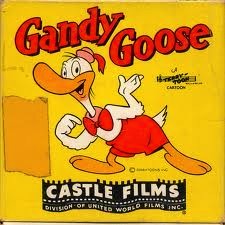| Gandy Goose | |
|---|---|
| Terrytoons character | |
 | |
| First appearance | Gandy the Goose (1938) |
| Created by | Paul Terry |
| Voiced by | Arthur Kay (1938–1941) Tom Morrison (1942–1955) Patrick Pinney (1987–1988) |
| In-universe information | |
| Species | Goose |
| Gender | Male |
Gandy Goose is a Terrytoons cartoon character who first appeared in the 1938 short Gandy the Goose. [1] He is frequently paired with Sourpuss, a cat, beginning in the 1939 short Hook Line and Sinker. Sourpuss' first appearance was in the 1939 short The Owl and the Pussycat, and had appearances without Gandy in the shorts How Wet Was My Ocean (1940), Fishing Made Easy (1941), and A Torrid Toreador (1942). Originally voiced by Arthur Kay from 1938 to 1941, Gandy spoke in a lyrical vocal parody of radio comedian Ed Wynn while Sourpuss vocally impersonated an impatient Jimmy Durante. Their surreal adventures often showcase extended dreams, bookended by coarse bedroom arguments.
Contents
Gandy was used to promote the U.S. war effort during World War II. In the cartoons, Gandy Goose joined the US Army in 1941 in the cartoon "Flying Fever" and also in "The Home Guard". [2]
Gandy Goose appeared in a total of 54 cartoons between 1938 and 1955. [3] He also made two appearances in Mighty Mouse: The New Adventures (1987–1988) voiced by Patrick Pinney. Sourpuss also appears in the series, voiced by Joe Alaskey. Here, Gandy and Sourpuss are heavily implied to be lovers and are shown showering together. [4]
Gandy Goose (along with Sourpuss) is one of the only characters who did not appear in the 1999 Terrytoons pilot Curbside.